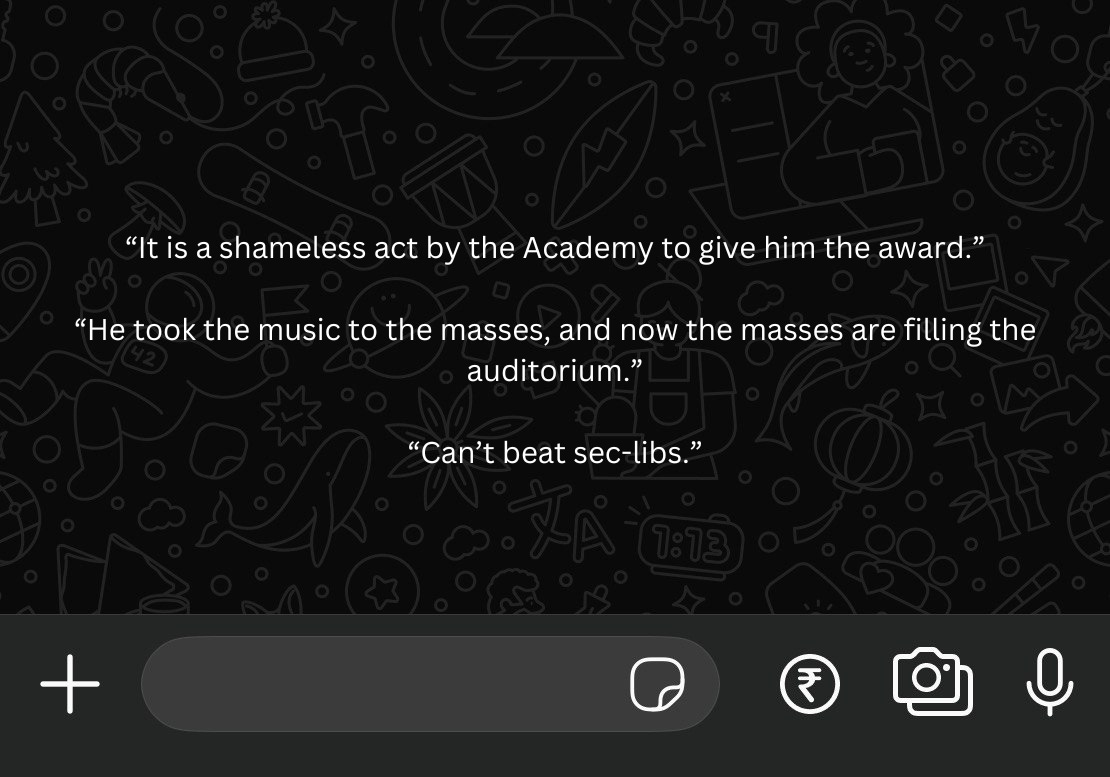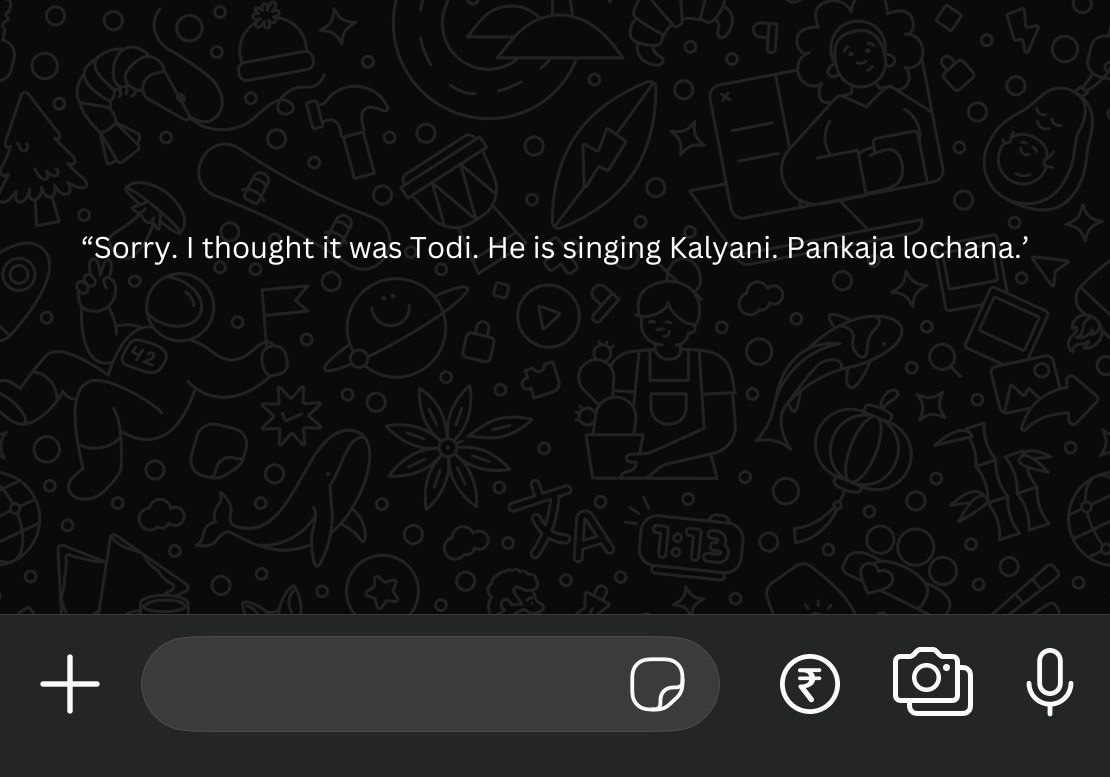Dear reader,
The characters and events in the letter that follow are fictitious and bear no resemblance to any person, living or dead. Unless of course, they have been written about in newspapers — then one isn’t quite sure.
—
In an ironed purple kurta, the man sitting in the row front of me had a cap of silver hair that needed some darning. He sat there, with his back to me, typing on his phone. You could draw a scalene triangle between his and my line of sight and the screen. There was a dilemma — should I look politely away at someone’s personal correspondence being left in plain sight for everyone to read? Or was it akin to listening to someone’s phone call made in public? Or — I was distracted by the usher shouting — “Evalavu neram-ma bathroom-la?”
The usher was harried. Their job description did not cover this Christmas morning where the seams of the main hall of the Music Academy bulged with people. They occupied every seat. They sat on the extra plastic chairs added on the aisles. They sat on the strip of walking space left on the aisles alongside the plastic chairs. They continued to throng through multiple entrances, like ants returning to the hill, looking around, trying to spot that one seat that their luck would turn magically vacant. Those who had reserved the seat next to them with a kerchief, handbag, plastic cover, saying, they have just gone to the bathroom, will return any moment, were being shouted at by the usher — how much longer are they going to sit in the bathroom? We need that seat now.
Even as I mentally cheered the quotes typed in with care, I was a bit confused with that dismissive reply. The responses came in quickly from his whatsapp group.
Now, I was more confused. Whose side was he on?
For there were sides in this storm in a steel davara as one activist had termed it during a conversation. On the one hand were one set of brahmins who were upset that TM Krishna was given the Sangita Kalanidhi award by the Music Academy. They pouted and penned strongly worded letters saying oh woe. On the other hand were the other side, unexpectedly championed by the Music Academy whose response was written with an angrezi quill dipped in multisyllabic ink.
TM Krishna’s writings on social issues have nothing new or remarkable to say — as anyone who has cared for these issues will tell you. His critique does stand out because other artists with similar privileges are happy to applaud the status quo and work hard to maintain it. And, his critiques gain attention because of the audience he speaks to, gleefully puncturing their pretensions of cultural clout. The audience he speaks to is in a bind — as he is one of the elite himself, the stakes are low, and given that his genius in music is not something anyone can question, he cannot be dismissed as an attention seeker. He is therefore like a gossamer gadfly — appealing and irritating.
And as all this is only of interest to a tiny demographic, the activist I had spoken to was rightly puzzled — why did anyone else care? Why is the Chief Minister of Tamil Nadu commenting on this issue?
When the ‘se’ was typed and he paused before completing, I pondered — what if he wrote, ‘can’t beat sex’ and sent it to his perhaps sexagenarian friend, what would their response be.
As I was distracted by the such unnecessary detours, the curtains started to part, and we saw that the stage too had people sitting around the podium. I spotted the gleaming shaven head of a friend from Greece seated on the stage; he visited Chennai every year as part of his India tour. I was told that during concerts, he usually bundled himself in multiple shawls, given the air conditioning in the auditoriums. During particularly trying concerts, I thought of him; such bundling could also aid a quick snooze here and there.
The audience exploded in applause till the curtains fully fell away.
The concert began and I realised there was something strange going on. Unlike the usual Carnatic concert, which is like a colourful celebration on stage, this was more like witnessing an intimate dialogue, between the singer, the violinist, and the audience. At times, like when singing the raag Yamuna Kalyani, TM Krishna paused, overwhelmed and choking with some unnamed emotion — the music was contemplative in a way that I had not experienced in Carnatic music. It felt like what Vilambit does in Hindustani music, the slow and considered way notes are treated that you dwell in an emotive soundscape.
Just like TM Krishna’s article on MS Subbulakshmi, threading her life experience with her art, I had a strong urge to read a meaty article on TM Krishna’s artistic journey, and how his activism mediated his relationship to his music. Having not seen him perform for many years now, I felt the concert was less a performance, more like an intense practise session.
When you practise music, with that sort of intense and continuous practise, at times the artist reaches places, a state the older Dagars described as, “Suron ke saath anandmay khilwaad honi chahiye.” You should play with the notes with utter abandon. The play takes you places, emotionally, artistically, which you have never seen or experienced. You may giggle, you may tear up, like TM Krishna did. When an audience witnesses this play, they are no more an audience, consuming what’s offered to them curated in a set menu. Strangely, they become human, a shared vulnerability ensconces us all.
He was referring to the same Yamuna Kalyani I wrote the last paragraph about. I almost giggled. Did we even inhabit the same universe?
I did giggle now, because the piece had started with a Todi aalaap before going to Kalyani. (A part of me did note that it was a mean girl giggle, but I shushed it.) I again wondered — why was he here? He did clap at times, either moved by the music or it could be peer pressure.
After that, TM Krishna sang a song written by Perumal Murugan, which said ‘Sudandiram Vendum’. We want freedom.
Before the song, TM Krishna asked in viruttam, ‘Enna thappu seiden’ — what wrong did I do. It was such a curious line in this context, for he was appealing, like a child asking a parent — what did I do wrong? Of course, the song’s context is different — a devotee asking the lord, what did I do wrong. Yet, sung at this moment and in this concert, I thought it blunted his opposition to the establishment, while underscoring his actions. Maybe, it made sense, for he was not excommunicated, only exiled, for a while.
Before I could clear my thoughts about that line, the main song began — Sudandiram Vendum. We want freedom. I clapped hard. The song spoke of what seems like a simple sentiment — we want freedom to sing anything, say anything, read anything, speak anything, think anything. Why is that a provocation?
It then made sense — when there’s a ban on who can speak/sing/touch/love/award whom — it is not TM Krishna who is affected. Focusing on him misses the point, like what Ta-Nehisi Coates said talking about his book ‘Message’. He said when people ban his books, he is not affected. In fact, let’s be honest, it helps his book sales. He said, it was not about him, but about the children. The people who ban books understand the power of books more than the people who oppose those bans. They understand how a child studying somewhere will now have a piece of the world glimmering in a different way, and it may provoke them to think about the state of this world, and may propel them to do something about it.
The Whatsapp man left before the concert ended. I don’t think he listened to Varugalamo or the Narayana Guru composition. I had so many questions to ask him, starting with, what’s the pay like for Whatsapp group spies. Do they have benefits? What about insurance? Do they plan to unionise?











Sruthi - thank you for this.
I hadn't realised you hadn't attended a concert by T M Krishna for a while! His music and pace, and the silences, made so much sense for someone like me, who never understood why Telisi Rama had to be sung at such a dizzying speed.
Thank you for bringing this concert alive for me.